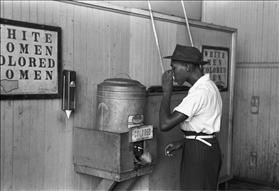It's not acceptable to resolve conflicts by discriminating against the other
Separate but equal in Israel? Why should this be considered okay?
Serious questions should arise, regarding the ongoing challenge of equal rights and access for the non-Orthodox movements Israel, which continues to follow the path of this unconstitutional principle of "separate but equal."
Uri Regev 16/06/2016 23:44
Tags: mikvas · Western Wall · non-Orthodox rabbis · discrimination · separate but equal

Man drinking from water cooler for ''colored people,'' courtesy of Wikipedia
The principle of "separate but equal" was historically considered an acceptable and moral resolution to clashes between majority and minority groups, which justified the majorities' refusals to allow the minorities access. However, more than 60 years ago in the 'Brown v. Board of Education' US Supreme Court case, this approach was declared unacceptable, and it was concluded that "separate but equal" is not really equal.
Unfortunately, the "separate but equal" approach is increasingly becoming the standard in Israel, when it comes to resolving conflicts of religion and state in the Jewish and democratic state of Israel.
The most recent example is the emerging "compromise" over the mikva'ot (ritual baths) controversy, wherein the ultra-Orthodox Government Coalition members refuse to allow implementation of the Israeli Supreme Court's ruling that ordered Israel's Religious Councils to grant non-Orthodox converts access to Israel's publicly funded mikva'ot. These politicians are strong arming the Government Coalition to pass counter-legislation, which would nullify the Supreme Court ruling, barring Reform and Conservative converts from the mikva'ot. In response, the Attorney General challenged the legality of this move, and the powers that be instead opted for the "separate but equal" model by pressuring the Jewish Agency to provide alternative mikva'ot for the non-Orthodox Movements. This initiative was prompted by the public declarations of the ultra-Orthodox coalition partners, that they will never agree to have the government recognize Reform and Conservative in any way.
Similarly, the essence of the historic Western Wall agreement was, in effect, the application of the "separate but equal" principle; providing the Movements and Women of the Wall with a separate "Kotel B" instead of permitting them to worship together with fellow Jews who have been praying at "Kotel A" for centuries.
"Separate but equal" is no longer an acceptable mode for resolving conflicts that are rooted in discrimination, in denial of civil liberties, and in delegitimization of the other. It is high time for Israeli and world Jewry to declare: "Enough is enough!"
The same mindset also underpinned the resolution of the Reform and Conservative movements' legal challenge when their rabbis were denied official state recognition and salaries for their service in Israel's rural communities, which their Orthodox counterparts enjoyed. Instead, under pressure by the Supreme Court justices, the Government offered them comparable financial support through the Ministry of Culture and Sports, rather than the Ministry of Religious Affairs (as grantees, rather than official rabbis); in order to allow the ultra-Orthodox-controlled Ministry of Religious Affairs to maintain its refusal to provide them with Government funds allocated for religious services to the Jewish community, thereby denying their legitimacy.
One may say (as the Supreme Court implied) that an imperfect, practical solution is preferable to a purist "all or nothing" stance. This is an ancient debate goes back in the Jewish tradition to the Talmudic question of whether compromise is a virtue or an anathema. While such compromises move the needle forward, inch by inch, Hiddush must point out that "separate but equal" is no longer an acceptable mode for resolving conflicts that are rooted in discrimination, in denial of civil liberties, and in delegitimization of the other. It is high time for Israeli and world Jewry to declare: "Enough is enough!" Israel's founding principles, which promised religious freedom and equality for all, deserve to be taken more seriously and implemented in earnest.
Relegating non-Orthodox Judaism, which represents the majority of diaspora Jewry, to second class status is not a healthy basis for ensuring the future of the Israel-diaspora relationship, nor is it compatible with Israel's own core identity as a Jewish and democratic state. Every day, Hiddush does its utmost to breathe life and vibrancy into these core values of freedom, equality and respect for religious diversity. We hope you will join us in the battle for a Jewish, democratic, and free Israel!